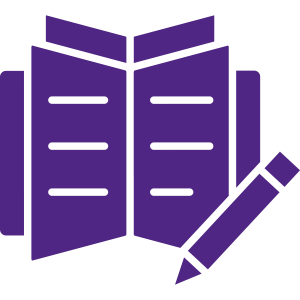2.2 Privacy, Intellectual Property & Copyright
Privacy, Intellectual Property & Copyright
A key ethical issue around the training and use of generative AI tools is understanding how data is being used. Privacy, intellectual property and copyright all need to be considered at all stages of generative AI development and use, including text and data mining (TDM), prompting, and the output of generative AI tools.
Text and Data Mining (TDM)
As we learned in the first section, generative AI is trained on massive datasets of texts and images. These datasets may include copyrighted or otherwise protected data or works.
In fact, multiple lawsuits have been filed against generative AI companies because of suspected unethical use of copyrighted content for training.
- The New York Times has sued OpenAI and Microsoft for using New York Times articles to train their Large Language Models

- A collective of artists has filed a class-action lawsuit against Stability AI, DeviantArt and Midjourney for using the work of millions of artists as training data

- Another lawsuit was filed against GitHub Copilot on behalf of open-source programmers who claim that using their code to train the Copilot AI was in violation of the open licenses

Ongoing discussions in Canada and abroad have focused on whether AI training and TDM require permission from copyright holders or should be an exception to copyright law (Government of Canada, 2025 ![]() ; WIPO, 2024
; WIPO, 2024 ![]() ). These discussions are ongoing as of early 2025.
). These discussions are ongoing as of early 2025.
Prompting
Another question of Intellectual Property is the information and data that is entered into generative AI tools by users. Different tools have different policies around the collection and use of personal data, including the data required to set up an account and any information included in prompts. Users may inadvertently provide personal or sensitive data in their prompts or queries to AI systems, many of which are saved, stored, and used by companies for training or other purposes.
Data is typically grouped into three risk levels:
- Low risk: data is non-sensitive and has minimal impact on privacy. Examples include email addresses and usernames.
- Medium high risk: includes personally identifiable information and may present some risk for privacy. Examples include names, addresses, phone number, and birthdays. Note that as more medium risk data is shared simultaneously, it can increase the risk levels (for example, providing a name, birthday, and address is riskier than just providing a name).
- High risk data: includes information that has significant implications for privacy risks. Examples include financial information and identification numbers (such as social insurance numbers).
The Freedom of Information and Protection of Privacy Act (FIPPA) ![]() states that you can only use personal information for the purpose it was collection and prohibits the use of an individual’s personal information for other purposes without their consent. The answers in completed assignments, exercises, exams, etc., are considered to be the personal information of the student. (See Western’s statement on FIPPA
states that you can only use personal information for the purpose it was collection and prohibits the use of an individual’s personal information for other purposes without their consent. The answers in completed assignments, exercises, exams, etc., are considered to be the personal information of the student. (See Western’s statement on FIPPA ![]() ).
).
Before adopting new technologies, it’s important for instructors to review and fully understanding the privacy, security and data management policies and practices of the tool and encourage students to do the same. It’s also important to understand the settings and features of each tool. For example, some tools may have settings that allow you to exclude your prompts from training data or create a temporary chat.

 Activity: Privacy Policies
Activity: Privacy Policies
Look at the privacy policy for a generative AI tool that you’re familiar with or interesting in exploring.
See Western’s Cyber Security Awareness Training ![]() for more information on safe digital practices regarding privacy.
for more information on safe digital practices regarding privacy.
Intellectual Property is also an important consideration when using generative AI. Any information included in your prompts is subject to existing copyright laws. It’s important to ensure that you have permission to use any content (text, images, data, etc.) that you are including in your prompts.
When considering using generative AI tools to support teaching and learning, it’s especially important to keep in mind that any work created by a student as part of their academic studies is their Intellectual Property and subject to the same copyright laws. (see Policy 7.16 – Intellectual Property ![]() ).
).
Consider the cases below to examine how privacy, copyright and intellectual property might impact the use of generative AI tools.
Ethical Case Study: Privacy and Consent
A popular video conferencing platform has introduced a new AI-based tool which can be used to summarize meetings, generate action items, summarize the chat, organize ideas, and more. This tool can be turned on by the meeting host. Users may opt out only by leaving the Zoom session.
What ethical considerations are there around using this tool?
Feedback
This introduces issues of privacy and consent as well as respecting individuals’ choice to opt-out of AI-use. If an instructor is using Zoom for virtual classes, they may turn on this tool in the Zoom session. If students would prefer to not have their data and contributions to the meeting used to train the AI, their only option is to leave the Zoom session. This presents inequitable access to course activities conducted through this platform. Instructors should consider obtaining full informed consent from all students in the class and refraining from using this tool if this consent is not granted by every student.
Ethical Case Study: Intellectual Property & Copyright
You are fine-tuning a Large Language Model to help your TAs with grading papers. You plan to train the LLM on all of the student submissions you’ve collected for an assignment from the past 3 years and work with it to accurately assess new papers.
What ethical considerations need to be made before moving ahead with this?
Feedback
Intellectual Property – if students didn’t grant you permission to use their work in this way, it is unethical and against UWO policy to do so.
Privacy – Some student submissions may also include personal data that should not be used for training or course exemplars, including their name, student number, or personal reflections or information in the submission itself. Even if consent is received, it’s important to remove any possibly identifying data and ensure that you’re only sharing low-risk data.
Works Generated by AI
Another question of Intellectual Property & Copyright arises with the output generated by generative AI models. The question that has been raised is whether or not works produced by non-human tools can be copyrighted. Currently, the discussions in Canada suggest that in order to be copyrighted, a work must have sufficient human input (Government of Canada, 2025 ![]() ). Works produced with generative AI may also raise concerns about copyright infringement if they are too similar to existing works.
). Works produced with generative AI may also raise concerns about copyright infringement if they are too similar to existing works.
Ethical Case Study: Intellectual Property & Copyright
You are an instructor for a first-year business course. You have elected to using generative AI to create a series of business cases to teach key concepts rather than paying for proprietary cases. You generate the cases and make revisions, as necessary. The cases work very well for your class, so you decide to share them under an open license for other instructors to use. A major publisher contacts the open library where you have shared the cases and requests that the content be removed claiming it is a copyright infringement because the cases very closely resemble materials in their collection.
What are the ethical considerations in this scenario?
Feedback
Because generative AI is not transparent, it is impossible to identify the sources that it was trained on and whether or not the generated output includes ideas or elements of copyrighted content.
Copyright laws and standards for providing credit to training data are still evolving, so there is not a clear process for checking for copyright infringement or acknowledging the works used to train AI.
At a minimum, it should be clearly acknowledged if/when content is generated with the assistance of AI. More information on how to cite AI-use is shared in the section on Pedagogy.
Generative AI is a type of Artificial Intelligence that creates new content, including text, images, videos, audio, and computer code.
A prompt is the text that is provided to the system providing instructions on the desired output or the task being requested.



Feedback/Errata